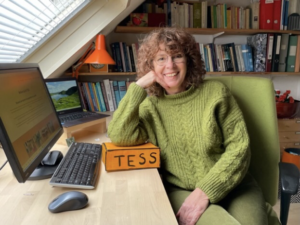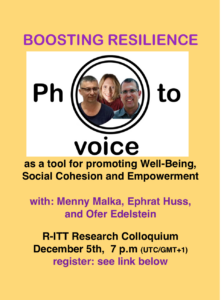

In the R-ITT colloquium on 19 March 2025, Mathilde Tubben presented the construction process of the Tubben Ego Strength Scale (the TESS). The TESS is a reliable and valid observation instrument that measures the social emotional development of children from 7 up till and including 12 years old by letting them build a hut. In the second part of her presentation, Mathilde demonstrated how the TESS scale can be used in clinical practice. She told us how she trains and teaches dramatherapy students and practising dramatherapists to use the TESS for diagnosis – and how much fun it can be! Mathilde’s aim is to continue to inspire dramatherapy colleagues to use the TESS scale as a diagnostic tool and to demonstrate the potential of this diagnostic tool she has developed for the dramatherapy profession, while at the same time making a real difference in practical work with children. – In the spirit of a practice-based understanding of research, the TESS diagnostic process is inextricably linked to the well-known dramatherapy method of hut building.
BIO
Mathilde Tubben works as a drama therapist and psychologist in the Netherlands. She was also a lecturer and supervisor at the drama therapy course at NHL Stenden. Her TESS research was undertaken with the University of Utrecht. She now teaches students and drama therapist in utilising the TESS, alongside her clinical work.
Further information:
* See adapted Powerpoint presentatoon upload: TESS_Scale_Tubben_Colloquium_032025
* Visit the TESS website: www.detess.nl
* See scientific justification: https://detess.nl/wetenschappelijke-verantwoording/

Boosting Resilience: Photovoice as a Tool for Promoting Well-Being, Social Cohesion and Empowerment
With: Ephrat Huss, Menny Malka & Ofer Edelstein,
from Ben-Gurion University, Negev, Israel. Together they conducted a study using Photovoice as a therapeutic as well as research method to work with older people in a participatory way. Prof. Ephrat Huss is head of the innovative MA program in Art for Social Workers and has published numerous articles on social art-based research. She is the author of groundbreaking books on the subject, including “What We See and What We Say: Using Images in Research, Therapy, Empowerment, and Social Change” (2013). Menny Malka is an expert in photovoice as a participatory research method. Ofer Edelstein brings his deep knowledge from years of quantitative research in gerontology and his personal experience of how this collaborative project has significantly enriched his view of research methods. – Part of the colloquium will be a brief self-experience with the photovoice method. Finally, we will reflect together on its transfer to drama therapy.
– Guest presentation of the qualitative study „Drama therapy as a mental health intervention for women in the shatila refugees camp, Lebanon“ (2022) by the authors Sara Sakhi, Dr. Lina Kreidie, and Farah Fardani (the later requested).
The study includes a field report with over 50 qualitative interviews on drama therapy interventions carried out in the Shatila refugee camp, south of Beirut. The Shatila Camp was founded in 1949 by the International Committee of the Red Cross and was actually intended to accommodate refugees from Palestine only for a short time. Today, people have been living here since they fled Palestine in the fourth generation. The Shatila Camp is the most populated refugee camp in Lebanon. According to estimates, there are now over 30,000 people in the overcrowded “transitional accommodation”, many of whom have fled Syria in recent years. The presentation will be held in English. We hope to provide via Zoom subtitling an AI simultaneous translation into German this time.
Here the powerpoint presentation
and the link to the Research Paper
Do., 16. Mai, von 19.00 Uhr bis 20.30 Uhr
DRAMA HIVE – Drama Therapy as Public Practice – with Rowena Tam & Cassandra Brennan
We were very happy to host our Canadian colleagues Rowena Tam and Cassandra Brennan at our research colloquium in May. Rowena and Brennan shared some of the current knowledge and approaches to public practice drama therapy in community settings. They argue that a public practice of drama therapy might be informed by decolonizing methods, liberation psychology, third spaces, public practice art therapy and the Art Hive model. A case vignette of Drama Hives was presented to highlight their experimentations with drama therapy as a form of public practice that might offer a more holistic approach to care that is complementary to the movement for decolonization.
Short bios of our guest presenters:
Cassandra Brennan (they/them) is a non-binary settler currently residing on the land of the Mississaugas of the Credit First Nation and Haudenosaunee in Ontario, Canada. Cassandra practices as a Drama Therapist & Registered Psychotherapist working with children and adults both virtually and in person. Cassandra is also a Level One DvT practitioner which informs much of their living research. The topic of public practice drama therapy has accompanied them since they finished their Master’s degree and they remain hopeful for this exciting evolution to continue.
Rowena Tam (she/her) is a drama therapist, Concordia University Ph.D. Student, and guest living and working in Tiohtiá:ke/Mooniyaang/Montréal, on unceded Kanien’kehá:ka territory. Rowena has public and private clinical experience working with frontline workers at Indigenous-serving organizations, women and Inuit men involved with the criminal in/justice system, poor and young racialized adults, as well as neurotypical and neurodiverse children and adults.
Here the powerpoint presentation
and the link to the Research Paper
Thursday, March 21, 2024, 7:00 p.m. to 8:30 p.m.
The Modern Shamanic Paradigm
with Susana Pendzik (in English)
For more information about Susana Penzik see: https://www.theatertherapie.org/ueber-uns/dozentinnen/
Here the powerpoint presentation
and the link to the video recording
Recording Research Colloquium „The Shamanic Paradigm with Susana Pendzik” (all copyrights R-ITT & Susana Pendzik 2024):
Part 1: Participatory drama therapy research & the transformative paradigm
Presentation followed by Q&A: Anke Schäfer
Donna Mertens’ “Transformative Paradigm” with regard to participatory drama therapy research was presented in detail and discussed together with the participants.
Donna M. Mertens herself was at the Q&A, and it was fantastic how she once again explained the immense importance of the “Transformative Paradigm” for social justice. The session with her was recorded live and you can watch it here:
https://youtu.be/G7le2f2Tj-c
Part 2: Foundation of the new ‘AG Wir forschen! – Doing research’ with presentation of the next steps: Björn Kaltwasser (together with Anke Schäfer). The working group was founded to discuss and develop possible research ideas based on practical experience. The working group currently has four members, but more are very welcome. The contact person for this is Björn Kaltwasser: info@bjoern-kaltwasser.de
Speakers: Ilil Land-Boss & Anke Schäfer
Ilil is a drama therapist (DGfT reg.), alternative practitioner for psychotherapy, actress, director, performer and lecturer. She holds an M.A. in theater and film studies, ethnology and linguistics and is currently pursuing a doctorate in theater/performance at the Zurich University of the Arts and the University of the Arts Graz.
Ilil Land-Boss presented findings from her ongoing doctoral project “Liminal and ritual spaces in participatory performance …”, which focuses on “artistic research, ritual research, embodiment, feminism and decolonization as challenges to traditional understandings of research and science”.
In addition, Anke introduced us to the “Transformative Paradigm”.
Minutes of the research round from 31.08.2023
Presentation by Ilil Land-Boss
“Arts-Based-Research – Background and possibilities of artistic and practice-oriented research for drama therapy” with Anke Schäfer
In a keynote speech, Anke Schäfer presented arts-based research and a summary of selected findings from the last WFKT symposium “The Art of Evidence”. Questions were then discussed together and concrete possibilities were considered.
Knowledge of social science or psychological research methods is rarely part of the expertise of drama therapists. As drama therapists, we are rather trained in artistic forms of reflection and our “research methods” are largely based on the artistic methods of theater: such as still images, role play, interpersonal interactions, transformation, rituals, transformation of the “playing space” and the role of the audience as “witness”.
How can we explore drama therapeutic processes on this basis? What possibilities does arts-based research offer here? What is that anyway? What does “The Evidence of Art” mean? And what does practice-based research have in common with arts-based research? And what might this look like in practice?
To the minutes of the research round: Minutes_ RITT_FR_2023-03-16
“Pilot study: Reconstruction of experience in drama therapy play situations” with Prof. Simone Klees
Prof. Simone Klees presented key findings from her pilot study, which she conducted at a hospital as part of her doctorate. She asked patients what they experience in play processes in a drama therapy group.
She then answered questions about the challenges of a doctorate in drama therapy.
Simone lives in Hamburg and has been a professor of drama therapy at MSH Medical School since 2022. In 2022, she completed her doctorate at Berlin University of the Arts in the Department of Performing Arts under Prof. Dr. Ute Schlegel-Pinkert. From 2018 to 2020, she was a substitute professor for drama therapy at the Nürtingen-Geislingen University of Applied Sciences. From 2016 to 2018 she was a scholarship holder at the Hochschule für Künste im Sozialen, Ottersberg. Simone has been working as a theater therapist/artistic therapist since 2011. She also holds an M.A. in Sociology, which she studied from 1994 to 2001 at Heinrich Heine University Düsseldorf, University of Hamburg and Goldsmith College London.
Click here for the protocol_2022-12-15
How can insights from drama therapy practitioners be increasingly incorporated into research, what formats could be conceivable here?
The title “The WOW moment” is inspired by our spring research round. Our Israeli colleagues Dr. Dovrat Harel and Dr. Shoshi Keisari gave a very vivid demonstration of how findings from many years of practice can lead to well-founded studies.
Dovrat called the initial spark the “WOW moment”: the experience in one’s own theater therapy practice of how repeatedly certain interventions have an immediate effect (“WOW”). The desire to communicate this insight to others in the healthcare system can then be fulfilled through a research project. We all know such “WOW” moments from our own theater therapy practice. We therefore want to give these “WOW moments” space and look together at how research projects could be developed from them.
Click here for the minutes_2022-09-29
Drama Therapy Research in Israel
with Dr. Dovrat Harel from Tel-Hai College and Dr. Shoshi Keisari from the University of Haifa.
Drama therapy research and methodology in working with older people.
Dr. Dovrat Harel: ” People with dementia as ‘spect-actors’ in a community musical theatre group: A qualitative study.”
Dr. Shoshi Keisari: “Integrating life-review and drama therapy for older adults: A mix method”.
Dr. Dovrat Harel is a registered drama therapist, supervisor, researcher and lecturer at the Drama Therapy Graduate Program, Tel-Hai College, Israel.
Her research activity focuses on old age and creative self-expression and on drama therapy for people with dementia and for their caregivers. Dovrat is also specializes in therapy for women in late life who were sexually assaulted. – PhD study: People with dementia as ‘spect-actors’ in a community musical theater group: A qualitative study.
Dr. Shoshi Keisari ist registrierte Dramatherapeutin, Supervisorin, Forscherin und Dozentin am Emilie Sagol Creative Arts Therapies Research Center und der School of Creative Arts Therapies der Universität Haifa, Israel. Ihre Forschungstätigkeit konzentriert sich auf die Bereiche Dramatherapie, klinische Gerontologie, Trauer und Verlust. Sie hat mehrere Arbeiten und ein Buch im Bereich Dramatherapie und Playback-Theater veröffentlicht. – PhD-Studie: Integration von Lebensrückblick und Dramatherapie für ältere Erwachsene: Eine Mischmethodenforschung
Weitere Informationen siehe online: https://cris.haifa.ac.il/en/publications/drama-therapy-in-late-life-taking-life-story-work-one-step-furthe
Invitation to all those interested in research to set up topic-specific research groups.
Suggested topics from the 1st round of research:
1. funding for theater therapy research projects – research
2. what research by non-academics can look like
3. what could research tandems look like? Academics in exchange with practitioners
4. what could I research? Exchange and support on topics from practice
Click here for the protocol_2021-11-25.
The purpose of the meeting was to provide information on the current status and to exchange information on ongoing, planned and prospective research projects (doctoral projects, master’s theses, evaluations in practice, etc.).
The guests were: Prof. Johannes Junker as dean of drama therapy studies at HfWU Nürtingen and Prof. Dr. Sabine Koch from RIArT – Research Institute for Creative Arts Therapies at Alanus University. Sabine provided information on doctoral opportunities, among other things.
Further information in the minutes_2020-10-22
